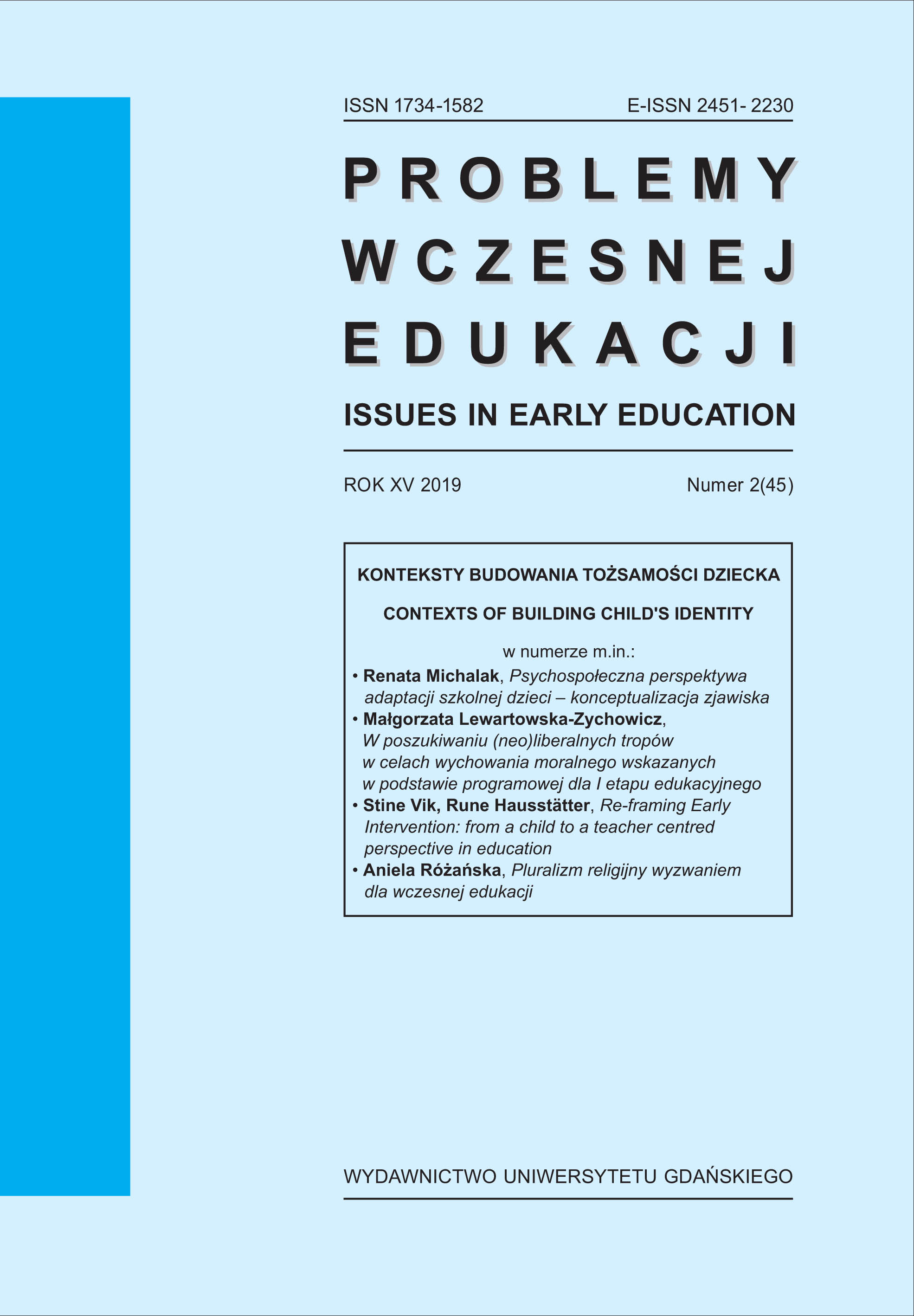Pytania egzystencjalne we wczesnej edukacji religijnej
DOI:
https://doi.org/10.26881/pwe.2019.45.05Słowa kluczowe:
edukacja religijna dzieci, dziecięce pytania egzystencjalneAbstrakt
The dispute on the possibility and shape of teaching religion in the public school has been going on for centuries. And although this education has found its place in school, the debate that is around them means that in the face of the challenges of pluralism, multiculturalism and multi-religiousness, it must constantly determine its status, mission, goals and tasks. There are still numerous doubts as to whether the school is at all the most appropriate place for shaping the sensitive areas of the human spirit, which is the religious worldview. The purpose of this text is to reflect on the place and role of existential questions in (Polish) early religious education. The text also asks about the dialogical nature of teaching, which is a cardinal prerequisite for philosophical inquiry in education (including religious education). For the purpose of this study, the analysis of “Basic Program of the Catechesis of the Catholic Church in Poland” from 2010 and 2018 was made.
Downloads
Bibliografia
Bartoś T. (2008), Jan Paweł II. Analiza krytyczna. Warszawa, Sic!
Chałupniak R. (2005), Między katechezą a religioznawstwem. Nauczanie religii katolickiejw szkole publicznej w Niemczech w latach 1945–2000. Opole, WT UO.
Charytański J. (1992), Lekcje religii w Europie. „Ateneum Kapłańskie”, 498.
Ekström U., Odencrants J. (1980), Livsfrågor och attityder hos barn i åldrarna 9–13 år. Stockholm, Högskolan för lärarutbildning, Institutionen för pedagogik.Gunnarsson G.G. (2018), Is a »life question approach« appropriate when religious education has become a part of social studies? W: J. Ristiniemi, G. Skeie, K. Sporre (eds.), Challenging life existential questions as a resource for education. Münster–New York, Waxmann.
Hartman S.G. (1986), Children’s philosophy of life. Stockholm, Institute of Education, Department of Educational Research.
Hartman S.G. (2000), Hur religionsämnet formades. W: Almén E., Furenhed R., Hartman S.G. Livstolkning och värdegrund: att undervisa om religion. Linköping, Linköping University.
Hartman S.G. (2018), Children Searching for a Philosophy of Life. W: J. Ristiniemi, G. Skeie, K. Sporre (eds.), Challenging life existential questions as a resource for education. Münster–New York, Waxmann.
Hartman S.G., Petterson S. (1980), Livsfrågor och livsåskådning hos barn: någrautgångspunkter för enanalys av barns livsfrågor och livsåskådning samt en presentation av några delstudier inom området. Rapport 7. Stockholm: Högskolan för lärarutbildning, Institutionen för pedagogik.
Hartman S.G., Petterson S., Westling G. (1973), Vadfunderar barn på? Stockholm, Utbildningsforskning.
Hasselrot T., Lernberg L.O. (ed.) (1980), Tonåringen och livet: undersökning och diskussion kring tonåringen och livsfrågorna. Stockholm, Liber Utbildningsförlaget.
Hovde Bråten O.M. (2018), World Views in Norwegian RE. W: J. Ristiniemi, G. Skeie, K. Sporre (eds.), Challenging life existential questions as a resource for education. Münster–New York, Waxmann.
Jackson R. (2004), Rethinking religious education and plurality: issues in diversity andpedagogy. London, Routledge-Falmer.
Jackson R. (2014), The development and dissemination of Council of Europe policy on education about religions and non-religious convictions. “Journal of Beliefs and Values”, 35(2).
KittelmannFlensner K. (2015), Religious education in contemporary pluralistic Sweden. Göteborg, Göteborgs Universitet.
Klus-Stańska D. (2002), Konstruowanie wiedzy w szkole. Olsztyn, Wydawnictwo UWM.
Klus-Stańska D. (2008), Mitologia transmisji wiedzy, czyli o konieczności szukania alternatyw dla szkoły, która amputuje rozum. „Problemy Wczesnej Edukacji”, 2(8).
KEP (Konferencja Episkopatu Polski) (2010), Podstawa programowa katechezy Kościoła katolickiego w Polsce. Kraków, WAM.
KEP (Konferencja Episkopatu Polski) (2018), Podstawa programowa katechezy Kościoła katolickiego w Polsce. Częstochowa, Edycja Świętego Pawła.
Lgr 62 (1962), Läroplan för grundskolan. Stockholm, Skolöverstyrelsen.
Lgr 69 (1969), Läroplan för grundskolan. 1, Allmän del. Stockholm, Utbildningsförlaget.
Lgr 80 (1980), Läroplan för grundskolan. Stockholm, Liber Läromedel/Utbildningsförlaget.
Lipman M., Sharp A.M., Oscanyan F.S. (1997), Filozofia w szkole. Warszawa, CODN.
Lpo 94(1994), Kursplaner för grundskolan. Stockholm, Utbildnings departementet.
Marek Z. (2017), Edukacja religijna w poszukiwaniu odpowiedzi na egzystencjalne pytania człowieka. „Paedagogia Christiana”, 2(40).
Mąkosa P. (2009), Katecheza młodzieży gimnazjalnej w Polsce. Stan aktualny i perspektywy rozwoju. Lublin, KUL.
Mąkosa P. (2011), Współczesne ujęcia nauczania religii w europejskim szkolnictwie publicznym. „Roczniki Pastoralno-Katechetyczne”, 3(58).
Pajer F. (1992), Nauczanie religii w europejskich systemach oświatowych. „Przegląd Powszechny”, 6.
Risenfors S. (2018), Liberal Muslim, Atheist Hindu and born-again christian identifications in relation to religion among three upper secondary students with experiences connected to migration. W: J. Ristiniemi, G. Skeie, K. Sporre (eds.), Challenging life existential questions as a resource for education. Münster–New York, Waxmann.
Sauer R. (2000), Religionsunterricht in Europa. W: H. Noormann, U. Becker, B. Trocholepczy (Hrsg.), Ökumenisches Arbeitsbuch Religionspädagogik. Stuttgart, Kohlhammer.
Sterkens C. (2001), Interreligious learning. The problem of interreligious dialogue in primary education. Leiden, Brill.
Stern E. (1957), Kind, Krankheit und Tod. München, E. Reinhardt.
Szczepska-Pustkowska M. (2008), Dziecięce filozofowanie (i filozofowanie z dziećmi) jako zasada pracy z uczniem. „Kwartalnik Pedagogiczny”, 1(207).
Śliwerski B. (2010), Czy możliwy jest w szkole dialog? „Paedagogia Christiana”, 1(25).
Tonåringen och livsfrågorna: elevattityder och undervisningen i livsåskådning och etik på grund-skolans högstadium: elevundersökningar och metodiska förslag av en arbetsgrupp inom skolö-verstyrelsen (1969), Stockholm, SÖ-förlaget.
Wright A. (2004), Religion, education and post-modernity. London, Routledge-Falmer.
Wright A. (2008), Contextual religious education and the actuality of religions. „British Journal of Religious Education”, 30.

 Uniwersyteckie Czasopisma Naukowe
Uniwersyteckie Czasopisma Naukowe





